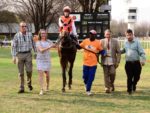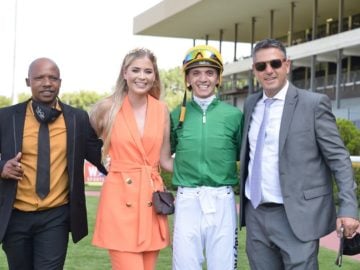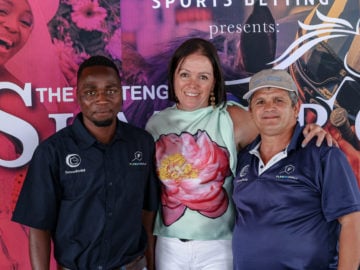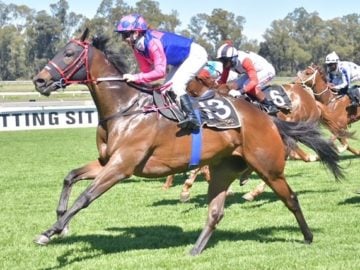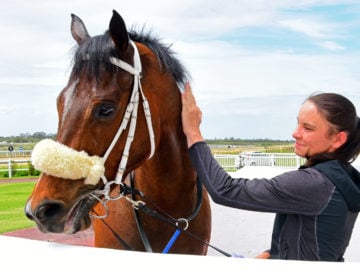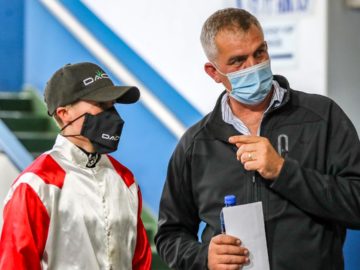When Dolf Maeder handed in his trainer’s license earlier this year, there was not so much as a whimper. As it turns out, NHA records reflect he’s one of 5 trainers not renewing their license for the 2015/16 season. We get to know Dolf a little better and ask whether racing should be concerned when horsemen of his calibre are leaving the industry.
For over four decades, Dolf has been an integral part of the local racing scene, and, evidenced by the fact that we meet up at The Farmyard Restaurant on the West Coast Road, it is clear that that won’t change anytime soon. On arrival, I’m greeted by Jason Pettigrew who tells me jovially that Dolf has just popped out to buy airtime, but will be back shortly. He shows me to the table where Dolf’s wallet, cell phone and keys have been left on the table. It’s clear he’s very at home here.
A few minutes later, Dolf’s tall, lanky frame comes bounding across the car park in a pair of board shorts and a faded T-shirt and he flashes a huge, disarming smile. As we order our coffee and tea, he chats away unselfconsciously, explaining that the Farmyard belongs to retired jockey Martin Uys and that Jason Pettigrew is the son of erstwhile jockey, Graham Pettigrew, now earning a living as a work rider for Mark Johnson in Newmarket. Eventually he fixes his kind, greeny-blue eyes on me and says “Well? What do you want to know?”
Adolf Gregory Maeder was born in Cape Town on 21 August 1954, making him 61 years old. He is one of two children and his sister Anita was the long-time partner of Cape trainer James Lightheart. His father, Carl Frederick Maeder – better known as Fritz – was a Swiss confectioner who immigrated to South Africa with his young wife and set up shop in Long Street selling sweets and chocolates. Fritz taught himself to cook and eventually took over the landmark Constantia Nek Restaurant where Dolf was born and raised, although in those days it only consisted of the old historic thatched roof barn – Fritz developed the additional buildings.
After several years in Constantia, Fritz purchased the Blue Peter in Blouberg and Dolf explains that his father added on the semi-circular frontage and eventually owned the whole block that the hotel is situated on. “I should have gone into cooking!” he jokes. “But in the restaurant business you start at 4am and finish at 1am. My father used to hang his trousers up at night and always said that when he got up in the morning, they were still shaking!”
Racing Family
It was during their Blue Peter years that Fritz got involved in racing. “I don’t know how he got involved, but he got involved,” says Dolf. “His first trainer was Alex Soteriadis. I was in Standard 9 at Bishops at the time. The bookwork went out the window and I started studying pedigrees. There was not a horse in the country I didn’t know,” he says proudly.
“My dad’s racing colours were the blue and white Blue Peter flag. It’s a nautical flag which means ‘about to set sail’ – they’re the colours Gaynor Rupert races in now. My dad had some good horses in his time such as Lancaster who eventually went to stud with Harry Shepherd, and Red Robe. My dad bought a share in Free Will and we had horses at Klein Dassenberg Stud with Brian Schonwald. Later on we bought a smallholding in Morning Star called White Horse Stud. I bred some nice horses there, including Karthala that I had in training with Greg Ennion,” he reminisces.
Deciding he wanted to be a stud manager, the late Sir Mordaunt Milner arranged for Dolf to learn the trade at Sir Kenneth and Lady Butt’s Brook Stud in Newmarket. He shared his Newmarket digs with a number of the National Stud students and says he spent most of his evenings helping them with foaling, etc. “I was getting a bit bored because at the end of the season they had me doing things like clipping hedges, picking up manure and painting fences and I thought can do that at home, so I left.”
“I decided to see who was good with fillies and went to work for Michael Stout for 2 seasons. I travelled horses to races and so on. It was fun.” Asked about any good horses he worked with, he says that Shahrastani was a 2yo at the time. “But the best horse I ever saw was one from the Noel Murless yard. One of Murless’ work riders was friendly with Stout’s head lad and he told us to watch a first timer of theirs. It won first time out and I had £20 on – he was called J.O. Tobin. Noel Murless postponed his retirement to keep training him. He won 3 in a row and then they sent him over to France for the Grand Criterium at Longchamp and he was beaten by a donkey called Blushing Groom! After that he went to the US and beat everything.”
“In between the racing, I did yearling prep back at Cheveley – they paid me £20 just to walk them round the ring. After that I came home because I wanted to start training.”
Starting out
“My old man knew ‘Baby’ Killa, so he gave me some boxes and I started out on his premises. He was a Welshman and hard as nails. I think he was champion trainer with only 6 horses. Believe me, I was in his feed room every day, learning. Another mentor I had was Stanley Gorton, who had a little grey horse with Baby Killa called Palenque. Every morning I’d make him tea in the office. Him and his flipping walking stick. He was banned from Pick & Pay for poking the staff with that stick!”
“Anyway, in those days you had to have 6 horses – I only had 5, and had to use my sister’s riding horse, Honest Penny to make up the numbers, but I wish I had five horses like that today. I had Quarantine, who’d been trained by James Lightheart as a baby and broken down. The only thing that kept him sound was the sea water – oh man, it is medicine. He was my first runner and ran unplaced but my 2nd, 3rd and 4th runners all won.” Included in the group was a 2yo homebred colt called Fernando from Free Will’s first crop. “Fernando won first time out and then I sent him into the WP Nursery where he was drawn 1 out of 12 and finished 4th, beaten by Horatius, Limnos (who died shortly afterwards) and Sunshine Man. Once you have a few winners, people start coming. Philip Zurnamer (owner of 1991 Cape Fillies Guineas winner Ilifa) was with me right from the start. I won the Langerman for Brian Schonwald with Silent Hero, beating Peter Kannemeyer’s favourite and next thing I know he sold it. I read in the paper ‘sold to Jean Heming.’ He never won another race.” He shakes his head. “I was at Blouberg for 4 years. When Baby Killa sold to Mr Millard I moved to Milnerton.”
Another big name runner was beautiful 1983 Cape Derby winner, Stella Maris. “He should have won the Met,” says Dolf with conviction. “He ran a nice race in the Queen’s Plate and in the Met, as he came into the straight he clipped heels and went right down. Garth Puller sprained his wrist and the horse knocked its front teeth out and he still finished 6th, 6 lengths off Wolf Power.”
Giving up
Despite having a sizeable string and some good horses in his string, Dolf gave up training in the early 90’s. “I’d had enough. People owed me so much money. I wouldn’t have a bond today if it wasn’t for all the money I’m owed. I’ve been out twice actually. The first time I became a bookmaker for a while. I was right on the Silver Ring where people bet in 10c pieces,” he smiles at the memory. “Then a friend warned that it was all about to change, so I sold up and started training again. I started at the farm that time. Some friends talked me into going to Durban and we ended up moving up there, but it was much the same story. People just didn’t pay and so I stopped again. I came back to Cape Town and started a golf driving range at the Melkbosstrand Country Club and then worked for a building firm for 2 years doing property repairs and maintenance. It was quite fun – totally different to what I’d done before and I learnt a lot, but it wasn’t really going anywhere. So I started up training again like an idiot,” he laughs. “I just enjoy the horses.”
Challenges
His stats show that he is still producing good results, so why is he packing it in again? “Training starts in the sales ring – you’ve got to be able to pick a horse. My dad had a terrific eye for a horse. I’ve got a good eye too and I’ve been blessed and picked some good horses for nothing. One year, there was a horse I had my eye on who was about to go through the ring. I saw Mr Millard go to his perch and panicked that he wanted ‘my’ horse, but he bought the one before. Then I saw old man Herman Brown go to his perch, but he bought a Harry Hotspur just after my one for R180k. The Millard horse never won a race and I think the Herman Brown horse won one race. And in the middle was Golden Taipan for R45k. I’m not saying that price makes a horse run, but these days you need buying power. If you want to be competitive, what you can buy on a budget is very limited.”
He’s not a fan of the Merit Rating system either, saying “In the old days, you didn’t keep moderate horses. Now, they’re quick to put a horse’s rating up and slow to bring it down again, so you end up keeping it in training longer than you might have to try and get the rating down so it can be competitive and earn again. I also think it kills the young horses.”
Then there’s the regulator. “Punters are what keep the game going. I think someone quoted some figures showing how often our Stipes hold enquiries vs other racing jurisdictions and I think that about says it all. Punters see strange rides and the jockeys don’t even get questioned. I know it’s difficult to prove that someone’s done something they shouldn’t, but people should at least be called in. When nothing is done, punters feel they’ve done their money in cold blood. They’d rather spend their money on sports betting because they feel they get more of a fair chance.”
And last, but by no means least, is the culture of non-payment. “If you could guarantee that you’d be paid up by the 5th of the month every month, racing would be the best game in the world. But people don’t pay and the minute two or three get behind, you’re in trouble. If it’s a decent horse, you don’t mind as you can try and make it back off the stakes, but if it’s a poor horse and the owner doesn’t pay, you end up being stuck with it.” I ask whether he has any ideas as to why racing clients pay so poorly and he answers reflectively, “It’s an expensive business and I don’t think there are really that many people who can still afford to own a racehorse. A few years ago, the sort of guys who would buy into a horse for R5k or R10k were a dime a dozen. They just don’t exist anymore. And if they do, they all want to be with a big yard. What’s wrong with the old guys? They are good horsemen. They were good trainers then, they’re good trainers now. All that’s changed is the buying power.”
So where to next?
“I’ve been making biscuits,” he says happily, “but so far they keep getting eaten before I manage to sell any! I’ve still got some moulds that my old man left that I use to make Easter Eggs to give as gifts to people – perhaps I’ll do that for a bit. My wife Heidi won a competition at work, so we’re off to Brazil for a few weeks and when we get back I’ll take it from there.”
We’ve been chatting for so long that the restaurant has been locked up. When I ask about paying for the drinks he says “It’s OK, they know me here.” And I can’t help feeling a little sad.
‹ Previous




